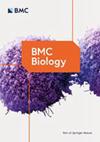The m6A writer KIAA1429 regulates photoaging progression via MFAP4-dependent collagen synthesis
IF 4.4
1区 生物学
Q1 BIOLOGY
引用次数: 0
Abstract
N6-Methyladenosine (m6A) methylation, a common form of RNA modification, play an important role in the pathogenesis of various diseases and in the ontogeny of organisms. Nevertheless, the precise function of m6A methylation in photoaging remains unknown. This study aims to investigate the biological role and underlying mechanism of m6A methylation in photoaging. m6A dot blot, Real-time quantitative PCR (RT-qPCR), western blot and immunohistochemical (IHC) assays were employed to detect the m6A level and specific m6A methylase in ultraviolet ray (UVR)-induced photoaging tissue. The profile of m6A-tagged mRNA was identified by methylated RNA immunoprecipitation sequencing (MeRIP-seq) and RNA-seq analysis. Finally, we investigated the regulatory mechanism of KIAA1429 by MeRIP-qPCR, RNA knockdown and immunofluorescence assay. m6A levels were increased in photoaging and were closely associated with the upregulation of KIAA1429 expression. 1331 differentially m6A methylated genes were identified in the UVR group compared with the control group, of which 1192 (90%) were hypermethylated. Gene ontology analysis showed that genes with m6A hypermethylation and mRNA downregulation were mainly involved in extracellular matrix metabolism and collagen metabolism-related processes. Furthermore, KIAA1429 knockdown abolished the downregulation of TGF-bRII and upregulation of MMP1 in UVR-irradiated human dermal fibroblasts (HDFs). Mechanically, we identified MFAP4 as a target of KIAA1429-mediated m6A modification and KIAA1429 might suppress collagen synthesis through an m6A-MFAP4-mediated process. The increased expression of KIAA1429 hinders collagen synthesis during UVR-induced photoaging, suggesting that KIAA1429 represents a potential candidate for targeted therapy to mitigate UVR-driven photoaging.m6A 作家 KIAA1429 通过 MFAP4 依赖性胶原合成调控光老化进程
N6-甲基腺苷(m6A)甲基化是一种常见的 RNA 修饰形式,在各种疾病的发病机制和生物体的本体发育过程中发挥着重要作用。然而,m6A 甲基化在光老化中的确切功能仍然未知。本研究采用 m6A 点印迹、实时定量 PCR(RT-qPCR)、Western 印迹和免疫组织化学(IHC)方法检测紫外线(UVR)诱导的光老化组织中的 m6A 水平和特异性 m6A 甲基化酶。通过甲基化 RNA 免疫沉淀测序(MeRIP-seq)和 RNA-seq 分析确定了 m6A 标记 mRNA 的概况。最后,我们通过甲基化RNA免疫沉淀测序(MeRIP-qPCR)、RNA敲除和免疫荧光检测研究了KIAA1429的调控机制。与对照组相比,紫外线照射组发现了 1331 个不同的 m6A 甲基化基因,其中 1192 个(90%)为高甲基化基因。基因本体分析表明,m6A高甲基化和mRNA下调的基因主要参与细胞外基质代谢和胶原代谢相关过程。此外,KIAA1429敲除可抑制经紫外线照射的人真皮成纤维细胞(HDFs)中TGF-bRII的下调和MMP1的上调。从机理上讲,我们发现 MFAP4 是 KIAA1429 介导的 m6A 修饰的靶标,KIAA1429 可能通过 m6A-MFAP4 介导的过程抑制胶原蛋白的合成。在紫外线诱导的光老化过程中,KIAA1429的表达增加会阻碍胶原蛋白的合成,这表明KIAA1429是一种潜在的候选靶向疗法,可用于缓解紫外线诱导的光老化。
本文章由计算机程序翻译,如有差异,请以英文原文为准。
求助全文
约1分钟内获得全文
求助全文
来源期刊

BMC Biology
生物-生物学
CiteScore
7.80
自引率
1.90%
发文量
260
审稿时长
3 months
期刊介绍:
BMC Biology is a broad scope journal covering all areas of biology. Our content includes research articles, new methods and tools. BMC Biology also publishes reviews, Q&A, and commentaries.
 求助内容:
求助内容: 应助结果提醒方式:
应助结果提醒方式:


